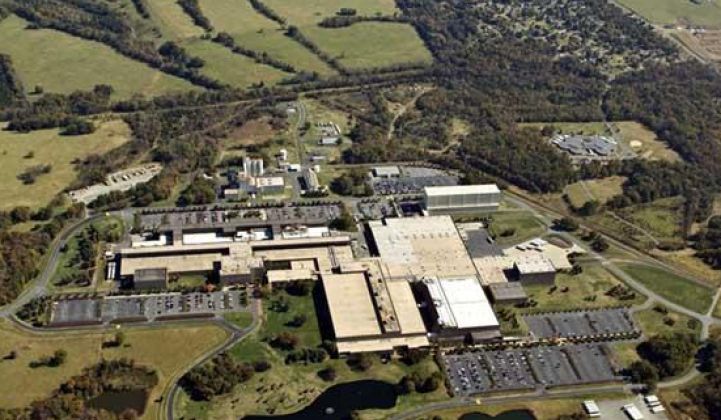Alevo, a battery manufacturing aspirant with mysterious sources of big funding, has made ambitious and as-yet-unmet promises concerning production and employment in North Carolina since its public launch 18 months ago.
In October 2014, Alevo unstealthed with claims of a new lithium-ion battery that could beat the competition in grid applications. As GTM has reported, Alevo claims its sulfur-based inorganic lithium-ion electrolyte chemistry has achieved 50,000 complete cycles without failure or loss of power density, while operating at close to room temperature. These claims have not been fully verified by a third party.
In February 2015, Alevo said it would financially back 200 megawatts' worth of energy storage projects as part of its agreement with Customized Energy Solutions to bring its battery systems to U.S. wholesale energy markets. Alevo is looking to provide the batteries, as well as to own and develop the projects, Jeff Gates, Alevo’s VP of operations, told GTM in a previous interview. The firm had suggested it would produce up to 100 of its 2-megawatt, 1-megawatt-hour modules before the end of 2015.
As GTM's Jeff St. John reported, Alevo is "taking on both the technology risks of an unproven battery and the market risks of investing in projects that must earn their money back over a decade or more of successful operation. That’s a risky proposition for investors -- but it’s certainly one way for a new battery technology to prove its worth a lot faster than would otherwise be possible."
Alevo's Gates also said at the time, “Until we go out there and prove it, that’s going to be a valid criticism. [...] But 12 months from today, when people see we’ve done what we said we would do, it won’t be.” As he put it, “How many other battery technology people are putting their money where their mouths are?"
Well, it's 12 months later, and the first of Alevo's 40-foot battery systems "has yet to roll off the production line," according to The Charlotte Observer. Instead, the first batteries are not due to be manufactured until the spring. A company spokesperson suggests that the company's first commercial deployment will be announced this week.
The Europe-based energy storage startup had stated it would eventually hire 2,500 people, matching the headcount of former site owner and employer Philip Morris within three years. The company even said, "The number could ultimately reach 6,000." The current headcount at the North Carolina facility, however, remains in the neighborhood of 200.
According to reports in The Charlotte Observer, "Alevo was so sure of its future that it sought no state or local incentives to locate its manufacturing base in Concord." Alevo's factory is a a former Philip Morris Marlboro cigarette factory on a 2,000-acre estate-like campus with a 2.3-million-square-foot main building and 330,000 square feet of parquet flooring. Alevo purchased the property from Philip Morris for $68.5 million, according to reports.
Local media sources also noted that "unpaid contractors have filed $4.3 million in liens against Alevo," but Alevo "received a new round of financing and will settle the claims [this] week."
Scott Schotter, the chief marketing officer at Alevo, was quoted by the Observer as saying, "Things have gone more slowly than the company had hoped when it announced its plans."
Here's an ominous quote from Schotter: “We don’t have any hard deadlines. We are vertically manufacturing from scratch a product that has not been commercialized yet.” This is a quote that could have come from the mouths of the CEOs of Solyndra or Nanosolar, two now-defunct solar firms that moved too fast to from pilot to market, expanding production in a big way before all the process controls and reliability requirements had been baked in.
The hype coming from Alevo is a consequence of an emerging, highly competitive energy storage market and the aspirational language that comes with VC funding and expectations. Alevo still has everything to prove. Gates said, "The real story is we are probably just eight months off of our schedule of Grid Banks rolling out the door. We'll be shipping units in the second quarter."
Alevo will have to compete against giant lithium-ion battery manufacturers like Panasonic, Mitsubishi, LG Chem, Samsung and Saft, as well as Tesla Motors, which is building a $5 billion Gigafactory in Nevada to churn out both vehicle and grid-scale batteries using Panasonic's lithium-ion cells.
As Ravi Manghani, senior energy storage analyst with GTM Research, noted in a quote a year ago that still applies today, Alevo “wants to achieve in two years what it's taken AES five to six years to accomplish with what's to date a commercially unproven technology.” In that light, “it all boils down to Alevo's technology. If the firm can achieve the performance metrics and cost structures needed, then they'll be in the money.”
Today, Manghani added, "Market realities have changed since Alevo's move to North Carolina. Alevo had identified merchant markets as an important piece of its commercialization strategy. PJM's frequency regulation remains the only market with large storage projects, but the interim cap on the amount of fast-responding regulation D resources may have something to do with the delays as well."
***
Jeff St. John contributed to this article.



